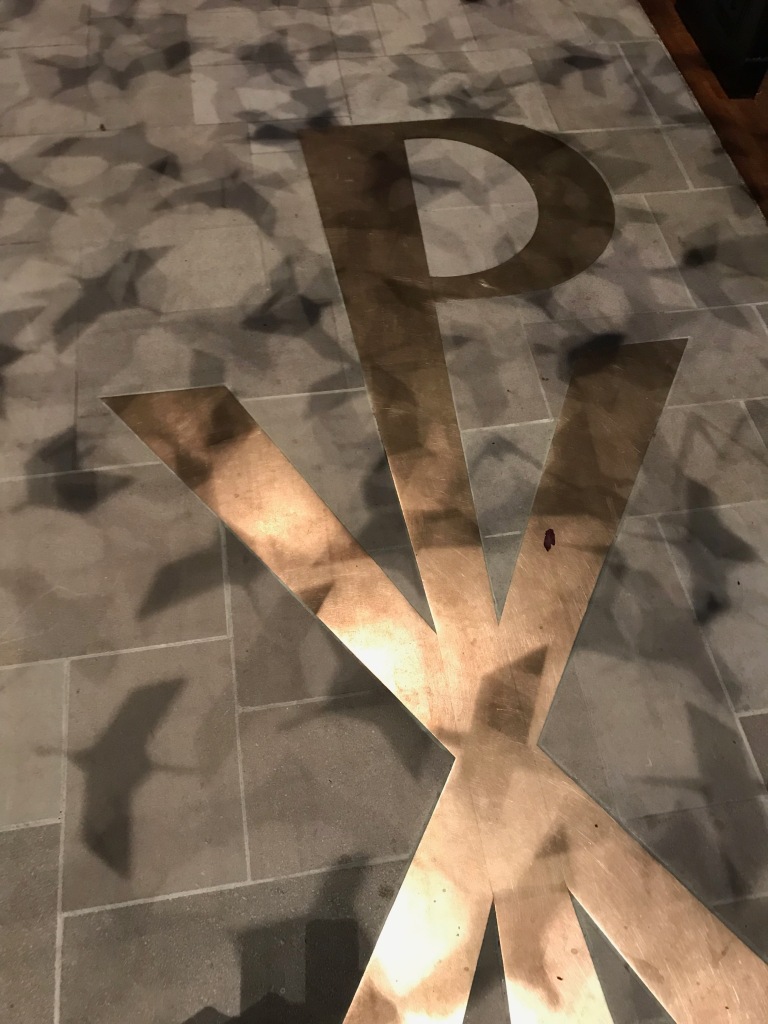Tags
Abraham, Easter, Genesis 18:16-33, Genesis 6:6-7, Genesis 6:8, Genesis 6:9-10, Good Friday, Grace, Judgment, Mercy, New Creation, Noah, Our brokenness, Sodom and Gomorrah, Truth, Violence
This post continues a series started as a project for Lent 2024 with “In Beginning”. I invite you to go there and follow the whole thread.

But Noah found favor in the sight of the LORD.
It’s troubling coming back to the Noah narrative. The words that introduce it are so painful. The earth is filled with violence. The thoughts of our hearts are only evil continually. All flesh has corrupted its ways upon the earth. (And by “all flesh” the text means all creatures; it’s the same word in 6:19 for all the animals. Humanity’s rebellion has infected everything, even the wild animals now live by violence.) God regrets making humanity. The heart of God is broken with grief. God intends to destroy it all.
We take the story of Noah lightly. We paint the ark on nursery walls and make children’s toys. But it is a profoundly disturbing narrative. The story begins with a fierce judgment about the world humanity makes. The animals peaceably assembling aboard the ark is the dying gasp of the Edenic world.
And the LORD was sorry that he had made humankind on the earth, and it grieved him to his heart. So the LORD said, “I will blot out from the earth the human beings I have created – people together with animals and creeping things and birds of the air, for I am sorry that I have made them.” (Genesis 6:6-7)
We can only read this story because of those few little words with which we began: “But Noah found favor in the sight of the LORD.”
That sentence contains just five words in the Hebrew, but on them the whole narrative turns. Suddenly, there is a crack in the pending darkness, the possibility of an unexpected future.
There is a curious play on words in this sentence: the word “favor” is “Noah” spelled backwards. It harkens back to the prophetic word of Noah’s father at his birth that “this one shall bring us relief from our work and from the toil of our hands.” But there is also a haunting note in our verse 8: the Hebrew phrase our text translates as “in the sight of the LORD,” is more literally, “in the eyes of the LORD.” That reference to eyes takes us back to Genesis 3 where the fruit of the tree was “a delight to the eyes” and the serpent promised it would “open their eyes.” Humanity’s eyes lead to all this violence, but God’s eyes lead to mercy.
One version of our story (the one using God’s name “LORD”) says simply that God’s heart is turned to favor. The other version of our story (calling God “God”) talks about Noah’s righteousness: “These are the descendants of Noah. Noah was a righteous man, blameless in his generation; Noah walked with God. 10And Noah had three sons, Shem, Ham, and Japheth.” (Genesis 6:9-10)
What our ancient writers were inspired to do was keep both these ideas together. Everything depends on God’s mercy. But faithfulness matters. God doesn’t save Noah because of his faithfulness (we are the ones who make that assumption), God chooses to have mercy. But faithfulness matters. When we get to the story of Sodom and Gomorrah, Abraham will argue with God about the fate of Sodom, asking if there were 50 righteous people in Sodom, would God destroy the righteous with the wicked? For Abraham, this was unthinkable, and he told God so. When God concedes not to destroy the city for fifty righteous, Abraham negotiates God down to ten. But the principle abides: One righteous family is enough for God to save the world.
With all the evils in the world why doesn’t God wipe us all out? For the sake of one faithful family.
There is no Easter without Good Friday, no forgiveness without confession, no mercy without truth. The judgment upon humanity’s corruption of God’s good world needs to be said before God’s favor can work its work and lead us into the new creation. But Easter comes. When hope seems lost, Easter comes. Mercy comes. A new path is created. God continues God’s life-giving work to restore God’s good world.
Noah found favor.
Wondrous Grace
Unexpected Mercy,
help us walk faithfully
for the sake of your world.
+ + +
Photo: DKBonde
New Revised Standard Version Bible, copyright © 1989 National Council of the Churches of Christ in the United States of America. Used by permission. All rights reserved worldwide. http://nrsvbibles.org
© David K Bonde, 2024, All rights reserved.








